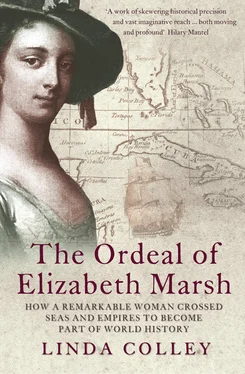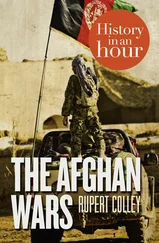I dispatch this express to give you advice that His Highness intends to place his Governors all along the coast as far as Tangier and Tetuan … the first Englishman that puts foot in his country he will make him a slave. 35
‘My ships and galliots at sea shall look out for you,’ Sidi Muhammad himself had warned a British sea officer in the summer of 1756, ‘and take you wherever they meet you.’ This deterioration in Anglo – Moroccan relations in late 1755 and early 1756 formed part of the background to the corsair attack on the Ann . When the Danish Consul in Morocco, Georg Höst, learnt of the incident, his sense of the captives’ plight was therefore initially unambiguous. ‘The passengers (some merchants and a woman)’, he noted in his diary, had been ‘detained as slaves’. 36
Riding out of Sla under guard with the rest of the captives on 30 August, Elizabeth Marsh knows little of this. She is both caught up in violent public events that she is in no position fully to understand, and preoccupied with the personal. She is intent, to begin with, on her physical comforts, on the fact that a Spanish merchant from Rabat has lent her a tent for the journey and improvised a sidesaddle for her mule that soon proves both painful and insecure. As the caravan moves southwards through plains and deserts towards Marrakech, she struggles more seriously with agoraphobia. For the first time in her life, she has moved out of sight of the sea, and she can no longer make out either any signs of permanent human settlement: ‘there was no appearance of a house or a tree but a large tract of country, abounding with high mountains, affording little worthy of notice, though I made as many observations as I could in my confined situation, without any books’. 37 Without books or maps, or personal access to Arabic, or Spanish, or any Berber language, and with no sequence of built towns by which to measure distance and progress, only a succession of douars or encampments, she is robbed of formal geography. She cannot give names to the stages of her journey. Since the caravan travels in the cool of the nights, and stops for short intervals of sleep during the hottest parts of the day, she is also deprived of a confident sense of clock and calendar time. She is dehydrated and malnourished, surviving for the most part on eggs and milk, and is now persistently reminded of her exposed female status. The makeshift sidesaddle has had to be abandoned for ‘such a machine as the Moorish women make use of’. This is placed across her mule ‘over a pack, and held a small mattress; the Moorish women lie on it, as it may be covered close; but I sat with my feet on one side [of] the mule’s neck, and found it very proper to screen me from the Arabs’. The device also increases her isolation, while further advertising that she is the lone female member of the caravan. When some passing Bedouin tribesmen are ‘inclined to be rude’, her guard shouts out – or so she is told – that ‘I was going as a present to Sidi Muhammad’. 38
The Moroccan admiral in charge of the caravan, Rais al-Hadj al-Arbi Mistari, seems to have taken it along a customary route for slaves and captives disembarked at Sla. Over the course of six or seven days (there is no sure way of telling, for the captives lose track of dates), they move south from Rabat, skirt the Middle Atlas mountains, cross the Oum er Rbia river, where she almost drowns, and finally the Tensift river just north of Marrakech. Elizabeth Marsh is not the first woman claiming Britain as her home to be forced to make this journey, nor will she be the last. She is, however, the first to record her experiences; indeed she is the first woman in history to write at length about Morocco in the English language. But the mental notes she stores up at the time are only occasionally those of a conventional travel-writer. Unlike many other eighteenth-century female travellers, she does not for example commit to memory anecdotes illustrative of her unusual pluckiness (though her physical hardiness in making this journey on mule-back and at a rapid pace is clear). Nor, with some exceptions – like her first sight of mountains ‘which reached above the clouds’ – is she much concerned with a landscape that for the most part she can see only as empty. 39 She travels under coercion, and under growing mental as well as physical stress, and as a result the journey she comes to describe is partly internal, an exploration of her own mind and fears.
Elizabeth Marsh’s Morocco
Eight miles outside Marrakech, the caravan halts, her tent is pitched and her sea-chest is opened, and through an interpreter Mistari orders her to change her dress ‘in order to make some figure at going into Morocco’. For the first time since leaving Sla, she puts on fresh clothes, wrapping a nightcap around her head for protection from the sun, ‘as I was told they did not intend to let me wear my hat’. Once ‘ornamented, as they imagined’, she is placed, not on her own mule, but in front of James Crisp on his:
At the same time, one of the guards pulled off his hat, and carried it away with him; which treatment amazed us extremely: But our astonishment increased, when our fellow-sufferers were made to dismount, and walk, two and two, bare-headed, the sun being much hotter than I had ever felt it, and the road so heavy, that the mules were knee-deep in the same. 40
So, as Elizabeth Marsh and James Crisp finally ride into Sidi Muhammad’s city and power base, they are cut off from the thousands crowding to see them, not just by fear and fatigue, but also by different systems of signs. The watching Moroccans may have interpreted their comparatively affluent Western clothes as a welcome demonstration that higher-grade captives than usual had been won, and could be ransomed accordingly. They would undoubtedly have noticed that all of the prisoners had been deprived of their hats, and therefore stripped after a fashion of their identity. Hats at this time were the most obvious sartorial markers of people who were European. But for Crisp – and even more for Elizabeth Marsh – being made to ride together on a broken-down mount amidst noisy and abusive crowds is likely to have had a different set of connotations. Apart from the obvious humiliation and discomfort, the ordeal would have been reminiscent to them of the crude charivari or rough music processions still sometimes inflicted by vengeful villagers and townsfolk in Britain, and in other Western European societies, on conspicuously adulterous or disorderly couples. Placing victims on a donkey, parading them through the streets ‘amidst raucous, ear-shattering noise, unpitying laughter, and the mimicry of obscenities’: this is what is customarily involved in rough music rituals. And this is what the ‘shouts and hallooings’ of the Marrakech crowd, the cuts inflicted on Crisp’s legs by the horsemen who hurtle past them, and the crude gestures made at Elizabeth herself would have reminded them of now. 41 Already deeply conscious of masquerading as husband and wife, they enter Marrakech the red, with its landscape of scattered, quadrangular minarets, in a manner reminiscent (to them) of shame and sexual misbehaviour.
Their self-consciousness increases when they are made to dismount, separated from the other captives, and confined for most of the afternoon alone in the upstairs room of an ancient castle three miles’ distance from Sidi Muhammad’s palace. Unconcerned by now with polite Western conventions, Crisp and Elizabeth Marsh allow themselves to sit on the floor, ‘lamenting our miserable fate’. As a result, when they are finally let out, brought outside the palace gates and, after more hours of standing, at last see the acting Sultan, it is through a haze not simply of exhaustion and European preconceptions, but also of more personal preoccupations. Elizabeth does register some things with conspicuous accuracy. She takes note of the acting Sultan’s concern with dignity and ritual: ‘He was mounted on a beautiful horse with slaves on each side fanning off the flies, and guarded by a party of the black regiment,’ that is by members of the ‘Abid al-Bukhari , forcibly recruited dark-skinned Haratin and black slave soldiers. She reports, correctly, that this encounter occurs in the open air. Unlike their fellow Sunni Muslims, the Ottoman Sultans, Moroccan rulers do not traditionally receive envoys, petitioners and supplicants in rich interiors. Nor do Moroccan Sultans customarily issue their pronouncements at audiences in writing by way of scribes, but – as on this occasion – personally and through the spoken word. She notes too how the ‘Moorish admiral and his crew’ fall on their knees before their ruler, kiss the ground ‘and, as they arose, did the same to his feet’. As a Moroccan envoy later records, it is a ‘custom with our Sultan, when we are close to him, we kiss the soil, which is considered as a prostration of gratitude [to God]’. 42 All these things Elizabeth Marsh sees and later writes down. But what does Sidi Muhammad see in this meeting?
Читать дальше












